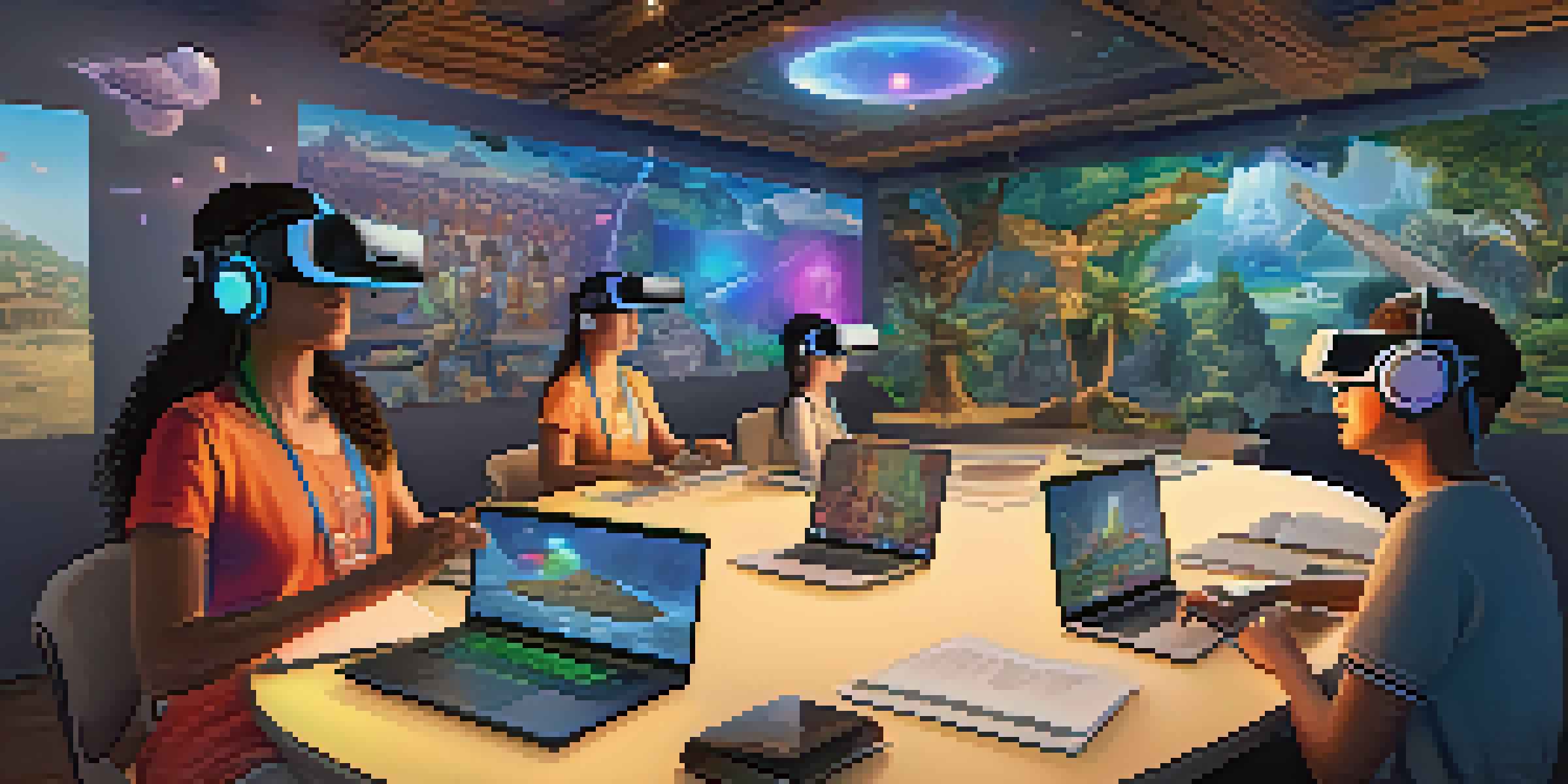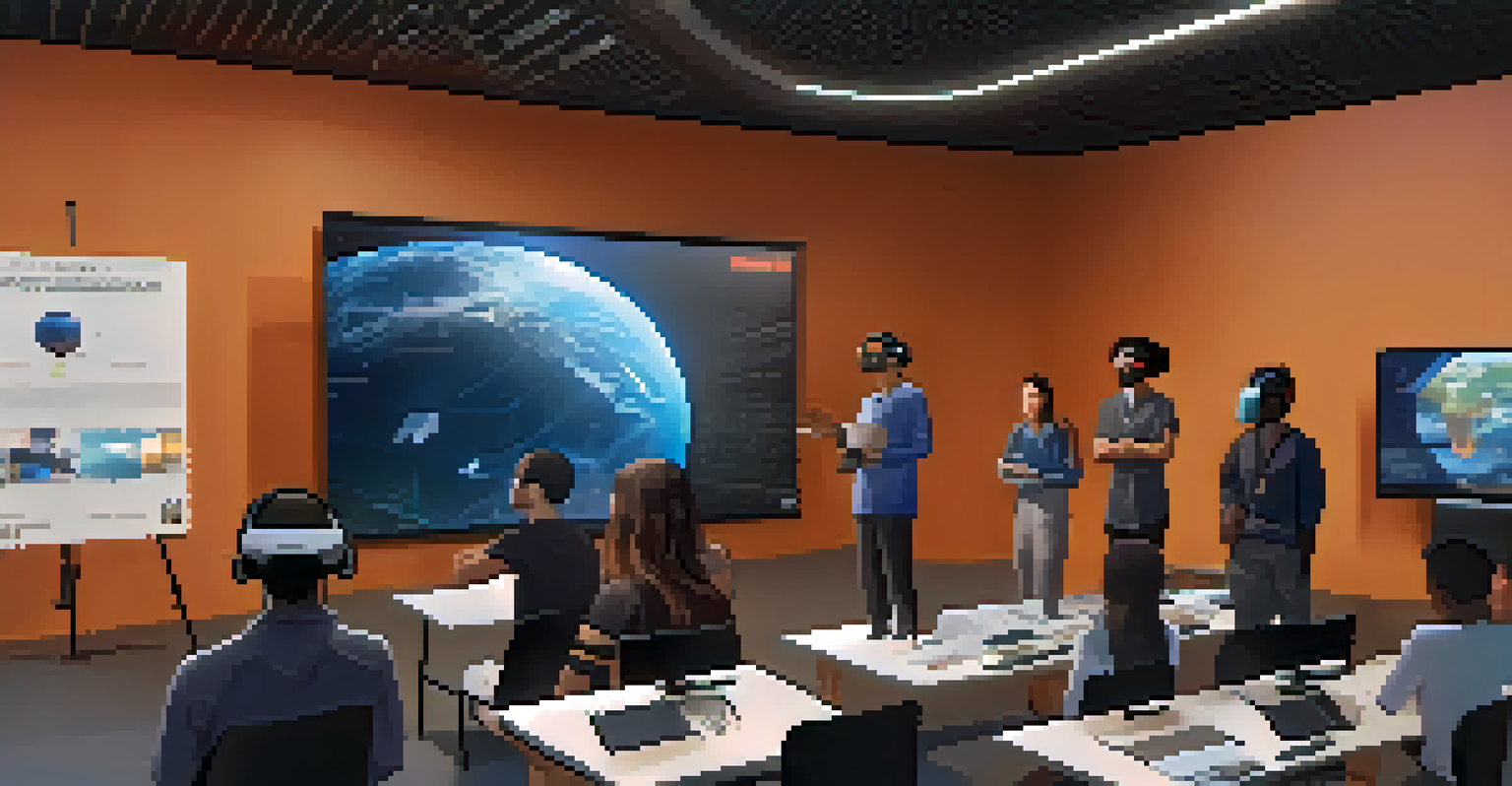How Virtual Reality Can Foster Lifelong Learning Habits

Understanding Lifelong Learning in Today's World
Lifelong learning is the ongoing, voluntary, and self-motivated pursuit of knowledge. In today's fast-paced world, this concept is more crucial than ever, as technology and industries evolve rapidly. People are increasingly seeking ways to keep their skills relevant, making lifelong learning a necessity rather than a choice.
Lifelong learning is the master key to the future, opening doors to endless possibilities and opportunities.
This commitment to continuous education can take many forms, from formal classes to self-directed study. The key is to cultivate a mindset that embraces curiosity and adaptability. Enter virtual reality (VR), a powerful tool that can significantly enhance this journey.
With VR, learners can immerse themselves in environments that stimulate engagement and retention. Imagine learning about ancient civilizations by walking through a virtual replica of their cities—this immersive experience can transform traditional education methods and foster a lifelong learning habit.
The Immersive Power of Virtual Reality
One of the standout features of virtual reality is its ability to create immersive experiences. Unlike traditional learning methods, VR allows users to step into a different world, making abstract concepts tangible and relatable. For instance, medical students can practice surgical procedures in a risk-free environment, gaining hands-on experience without real-world consequences.

This immersive nature not only enhances understanding but also boosts motivation. When learners see and feel the relevance of what they’re studying, they are more likely to engage deeply with the material. The engagement created by VR can convert passive learning into an active exploration, making education feel more like an adventure.
Lifelong Learning is Essential
In today's fast-paced world, the pursuit of knowledge through lifelong learning has become a necessity for maintaining relevant skills.
Furthermore, VR can cater to different learning styles, whether visual, auditory, or kinesthetic. By offering diverse experiences, it ensures that everyone can find a method that resonates with them, fostering a more inclusive learning environment.
Breaking Down Geographic Barriers with VR
Virtual reality has the unique power to remove geographic limitations, enabling learners from all corners of the globe to access the same resources. Imagine a student in a remote village attending a lecture by a renowned expert from another country, all through a VR headset. This accessibility can democratize learning opportunities and bridge gaps that traditional education often faces.
Education is not the filling of a pail, but the lighting of a fire.
With VR, learners can connect with peers and educators worldwide, allowing for collaboration and cultural exchange. This global perspective enriches the learning experience, as students gain insights from diverse backgrounds and viewpoints. Such interactions can foster a sense of community and belonging, crucial for developing lifelong learning habits.
Moreover, by breaking down these barriers, VR encourages learners to pursue knowledge continuously, regardless of their physical location. This newfound accessibility can inspire a passion for learning that lasts a lifetime.
Promoting Engagement Through Gamification
Gamification, the integration of game-like elements into learning, has proven to increase engagement significantly. Virtual reality takes this concept a step further, offering immersive and interactive experiences that captivate learners. When education feels like a game, students are more likely to participate actively and enjoy the process.
For example, imagine a science class where students can explore the human body in 3D, complete with challenges and rewards for completing tasks. This playful approach not only makes learning fun but also reinforces concepts through hands-on experience. The stakes feel lower, encouraging students to take risks and explore without the fear of failure.
VR Enhances Learning Experiences
Virtual reality transforms education by providing immersive, engaging environments that cater to various learning styles.
The thrill of gamification in VR can lead to a sense of achievement that encourages learners to persist, fostering lifelong learning habits. When education feels rewarding, individuals are more likely to continue seeking knowledge long after the formal learning has ended.
Enhancing Retention Through Experiential Learning
Experiential learning, or learning through experience, is a pivotal aspect of effective education. Virtual reality allows learners to engage in real-life scenarios, which can significantly enhance retention rates. For instance, training in emergency response can be simulated in VR, helping trainees remember procedures by practicing them in a lifelike environment.
This hands-on approach aligns with the concept of learning by doing, which has been shown to improve memory retention. When learners actively participate in their education, they are more likely to grasp and recall information. VR provides the tools to mimic real-world challenges, making the learning process dynamic and impactful.
By embedding experiential learning in virtual reality, individuals can develop critical thinking and problem-solving skills that are essential for lifelong learning. This method not only prepares them for future challenges but also instills a habit of seeking out new experiences.
Fostering a Safe Space for Mistakes
One of the most significant barriers to learning is the fear of making mistakes. Virtual reality offers a safe environment where learners can experiment and fail without real-world repercussions. This aspect is particularly beneficial in fields like aviation or medicine, where practice is crucial yet comes with high stakes.
In VR, learners can try out different strategies, make mistakes, and learn from them in a controlled setting. This freedom to fail encourages exploration and innovation, essential components of lifelong learning. By reducing the fear associated with errors, VR empowers individuals to take risks and broaden their knowledge base.
Global Access to Education
VR breaks down geographic barriers, enabling learners worldwide to access the same educational resources and collaborate across cultures.
Eventually, this safe space cultivates resilience and adaptability, traits that are invaluable for anyone committed to lifelong learning. Embracing mistakes as part of the learning process can lead to a deeper understanding and a more profound appreciation for the journey of education.
The Future of Lifelong Learning with VR
As technology continues to evolve, the potential for virtual reality in education grows exponentially. The future of lifelong learning is painted with the promise of advanced VR experiences that can adapt to individual needs. Imagine personalized learning journeys that evolve with each learner’s pace and style, making education even more accessible and engaging.
Educational institutions and organizations are beginning to recognize the benefits of incorporating VR into their curricula. This shift not only enhances the learning experience but also prepares individuals for a rapidly changing job market that values continuous skill development. The integration of VR could redefine how we approach education and professional training.

Ultimately, as virtual reality becomes more mainstream, it will play a crucial role in fostering lifelong learning habits. By breaking down barriers, enhancing engagement, and providing immersive experiences, VR can help create a culture where learning is seen as an exciting, ongoing journey.